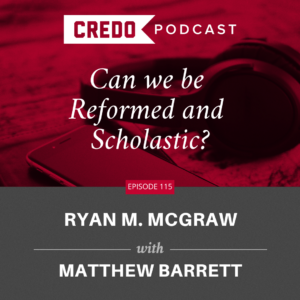Show Notes
 Reformed and Scholastic are often considered antithetical to one another, as if the use of the scholastic method or the retrieval of its philosophy and theology is a betrayal of the Reformation. Such a popular narrative is more fiction than fact, a convenient caricature that misrepresents the Reformed heritage of the sixteenth through the eighteenth centuries. In truth, a wide spectrum of Reformed Orthodox theologians appropriated the tools of Scholasticism to codify orthodoxy in universities and for the sake of the church. The Reformed Scholastics were unembarrassed in their critical appropriation of medieval Scholastics (Anselm, Aquinas, etc.) for the sake of defending their reformed, orthodox convictions against heretical groups like the Socinians.
Reformed and Scholastic are often considered antithetical to one another, as if the use of the scholastic method or the retrieval of its philosophy and theology is a betrayal of the Reformation. Such a popular narrative is more fiction than fact, a convenient caricature that misrepresents the Reformed heritage of the sixteenth through the eighteenth centuries. In truth, a wide spectrum of Reformed Orthodox theologians appropriated the tools of Scholasticism to codify orthodoxy in universities and for the sake of the church. The Reformed Scholastics were unembarrassed in their critical appropriation of medieval Scholastics (Anselm, Aquinas, etc.) for the sake of defending their reformed, orthodox convictions against heretical groups like the Socinians.
Theologian Ryan McGraw joins Matthew Barrett to define Reformed Scholasticism, introduce theologians like Francis Turretin and John Owen, and explain why we should retrieve these post-reformation reformers for the sake of renewing theology today. Far from a contradiction, Reformed and Scholastic is our heritage.
Ryan M. McGraw serves as the Morton H. Smith Professor of Systematic Theology at Greenville Presbyterian Theological Seminary. He is the author of several books, including John Owen: Trajectories in Reformed Orthodox Theology (Palgrave Macmillian, 2017) and Reformed Scholasticism: Recovering the Tools of Reformed Theology (T&T Clark, 2020).
Matthew Barrett is the author of Simply Trinity: The Unmanipulated Father, Son, and Holy Spirit (Baker). He is the founder and executive editor of Credo Magazine and host of the Credo podcast. He is associate professor of Christian theology at Midwestern Baptist Theological Seminary and Director of the Center for Classical Theology. He is currently writing a Systematic Theology (Baker Academic).
